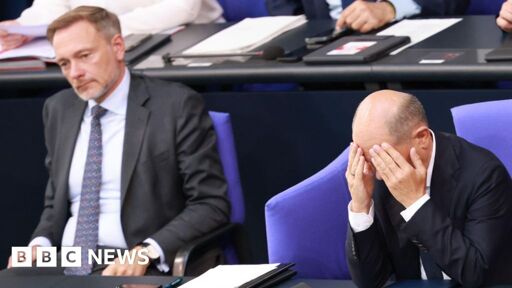- cross-posted to:
- world@lemmy.world
- cross-posted to:
- world@lemmy.world
spoiler
Germany’s governing coalition is in crisis after Chancellor Olaf Scholz fired a key minister and said he would call a vote of confidence in his government early next year.
Scholz said he had no trust in Finance Minister Christian Lindner, who leads a rival party that has been part of the coalition along with Scholz’s Social Democrats and the Greens.
The move means Scholz’s government no longer has a majority in parliament. The confidence vote could lead to early elections by March.
The so-called “traffic light” coalition led by the chancellor has governed Germany since 2021.
But internal tensions had been bubbling for weeks before exploding into the open on Wednesday night.
Scholz said his former finance minister had “betrayed my confidence” and had put the interests of his party base over those of the country.
He added that Germany needed to show it could be relied upon by other countries, particularly following the election of Donald Trump in the US.
Lindner accused Scholz of “leading Germany into a phase of uncertainty”.
The crisis inside the coalition plunged Europe’s largest economy into political chaos, hours after Trump’s election triggered deep uncertainty about the future of the continent’s economy and security.
When the coalition between the chancellor’s centre-left Social Democrats, the environmentalist Greens and economically liberal FDP was formed in 2021, each party planned to spend big on its own individual core interest groups.
However, Russia’s full-scale invasion of Ukraine in 2022 sent energy prices surging, and left Germany facing a increase in defence spending - and the cost of taking in 1.5 million Ukrainian refugees.
Germany is now facing its second year without economic growth.
Scholz and his Green partners want tackle this by loosening constitutional rules on public debt to allow more spending. Lindner wants to pay for tax cuts by slashing welfare and social budgets and pushing back environmental targets.
Economy Minister Robert Habeck of the Greens said the party would not quit the government and that its ministers would remain in office.
Scholz announced that a vote of confidence would be held in Germany’s parliament, the Bundestag, on 15 January.
If MPs vote down the government, the country would hold fresh elections within weeks, instead of the scheduled date in September.
They ar literally arguing if they can finance ukraine and policy simultaneously or not. And the dipshit germans will elect cdu next, who has gone absolutely unhinged (retvrn to founders more like, but whatever) over ukraine as well.
Fucking stellar all around, that’s leaving aside migrant policies where cdu is afd tier, and pisrael worship (which is same as greens).
Can someone explain this to me, an American with a basic understanding of parliaments and coalition building?
Imagine you and your friends want to eat a burger but none of you have all the ingredients
So 1 friend brings the buns, the other guy brings the cheese and you bring the patty now imagine the bun guy doesn’t like the cheddar that the cheese guy bought and he wants american cheese instead so he kicks the cheese guy out of the burger coalition and now they have to look for a new guy to bring the cheese




